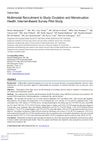
Stress significantly contributes to hair loss, especially in women and those aged 31-40.
 12 citations,
February 2023 in “Journal of Personalized Medicine”
12 citations,
February 2023 in “Journal of Personalized Medicine” Type 1 diabetes often occurs with other autoimmune diseases, and personalized treatment based on genetics can improve outcomes.
 July 2021 in “Open access journal of biomedical science”
July 2021 in “Open access journal of biomedical science” A lotion with natural extracts significantly sped up hair growth in women with hair loss from chemotherapy.
 December 2016 in “British Journal of Dermatology”
December 2016 in “British Journal of Dermatology” The meeting highlighted the importance of genetic testing and multidisciplinary approaches in pediatric dermatology.
 January 2009 in “Elsevier eBooks”
January 2009 in “Elsevier eBooks” Some plant-based treatments may help with ovary function, insulin resistance, and excess male hormones in PCOS, but more research is needed to confirm their safety and effectiveness.
 86 citations,
August 2014 in “Journal of The American Academy of Dermatology”
86 citations,
August 2014 in “Journal of The American Academy of Dermatology” To diagnose hair loss, use a systematic approach including history, exams, and tests.
 January 2023 in “Skin appendage disorders”
January 2023 in “Skin appendage disorders” Low-dose oral minoxidil may help treat hair loss but is not FDA-approved and can cause side effects like unwanted hair growth and heart issues.
 May 2009 in “The American Journal of Dermatopathology”
May 2009 in “The American Journal of Dermatopathology” Mast cells play a significant role in hair loss conditions like male pattern hair loss and alopecia areata.
 29 citations,
May 2018 in “Clinical Endocrinology”
29 citations,
May 2018 in “Clinical Endocrinology” Recent genetic insights show that low-renin hypertension includes a range from essential hypertension to secondary or familial forms, affecting diagnosis and treatment.
 8 citations,
February 2020 in “Aesthetic Surgery Journal”
8 citations,
February 2020 in “Aesthetic Surgery Journal” Adding cells to fat grafts improves hair regrowth in early baldness, but effects lessen over time.
2 citations,
July 2022 in “Frontiers in Medicine” Combining minoxidil with microneedling or spironolactone is more effective for female hair loss than using minoxidil alone.
 2 citations,
January 2004 in “Elsevier eBooks”
2 citations,
January 2004 in “Elsevier eBooks” Lupus affects the skin in various ways, and proper skin examination is crucial for diagnosis and treatment.
 67 citations,
November 2002 in “Journal of The American Academy of Dermatology”
67 citations,
November 2002 in “Journal of The American Academy of Dermatology” The document concludes that careful evaluation is key to diagnose and treat women with hair loss, with tests for thyroid, iron, and hormones as needed.
 2 citations,
January 2013 in “Elsevier eBooks”
2 citations,
January 2013 in “Elsevier eBooks” The chapter explains the causes of excessive hair growth and masculinization in women and how to measure hormone levels related to these conditions.
 9 citations,
April 2023 in “Journal for Research in Applied Sciences and Biotechnology”
9 citations,
April 2023 in “Journal for Research in Applied Sciences and Biotechnology” Zinc is important for growth and health in animals, plants, and humans, and not having enough can cause various problems.

Proretinal nanoparticles are a safe and effective way to deliver retinal to the skin.
 1 citations,
November 2023 in “Brain and behavior”
1 citations,
November 2023 in “Brain and behavior” Spironolactone improved cognitive performance and early sleep quality but not manic symptoms, appetite, or body weight in bipolar disorder when added to sodium valproate.
 2 citations,
January 2018 in “Dermatology Review/Przegląd Dermatologiczny”
2 citations,
January 2018 in “Dermatology Review/Przegląd Dermatologiczny” Use trichoscopy to diagnose hair loss; treat with minoxidil, finasteride, or dutasteride; consider platelet-rich plasma and spironolactone.
 January 2024 in “Polski Merkuriusz Lekarski”
January 2024 in “Polski Merkuriusz Lekarski” Pica disorder in central Iraq is mainly found in females and is linked to low iron levels; treatment with iron improves most patients.
 1 citations,
January 2023 in “IEEE access”
1 citations,
January 2023 in “IEEE access” Deep learning helps detect skin conditions and is advancing dermatology diagnosis and treatment.
 2 citations,
January 2023 in “Prague Medical Report”
2 citations,
January 2023 in “Prague Medical Report” JAK inhibitors, like baricitinib, are effective and safe for treating alopecia areata.
 4 citations,
March 2020 in “Cutaneous and ocular toxicology”
4 citations,
March 2020 in “Cutaneous and ocular toxicology” Wen by Chaz Dean Sweet Almond Mint Cleansing Conditioner is better tolerated than salicylic acid and baby shampoos.
29 citations,
January 2020 in “Frontiers in endocrinology” Fibrodysplasia ossificans progressiva is a rare genetic disorder that causes extra bone growth and symptoms of premature aging.

Multimodal recruitment effectively gathered a diverse group for an online survey on ovulation and menstruation health.
October 2023 in “International journal of molecular sciences” Key proteins and pathways regulate wool fiber diameter in Alpine Merino sheep.
1 citations,
October 2023 in “PloS one” Cosmetic hair treatments can increase hair testosterone levels, while natural hair color does not affect it.
90 citations,
April 2013 in “Dermatology online journal” Different treatments for Hidradenitis suppurativa range from antibiotics and hormonal therapies to surgery, depending on severity.
 32 citations,
February 2017 in “Human Reproduction”
32 citations,
February 2017 in “Human Reproduction” Women with polycystic ovary syndrome tend to have a longer anogenital distance.
 10 citations,
August 2023 in “Advanced Science”
10 citations,
August 2023 in “Advanced Science” Nitric Oxide has potential in medicine, especially for infections and heart treatments, but its short life and delivery challenges limit its use.
 25 citations,
November 2022 in “British journal of dermatology/British journal of dermatology, Supplement”
25 citations,
November 2022 in “British journal of dermatology/British journal of dermatology, Supplement” Baricitinib for severe alopecia areata is generally safe, with common side effects like infections and acne, and low rates of serious complications.

























